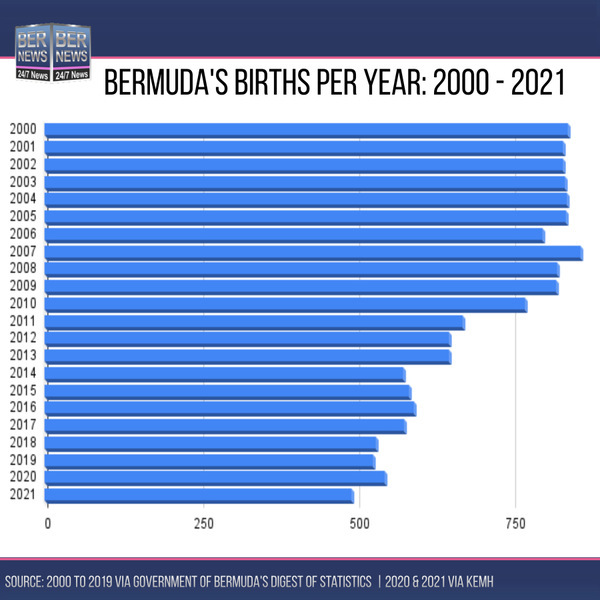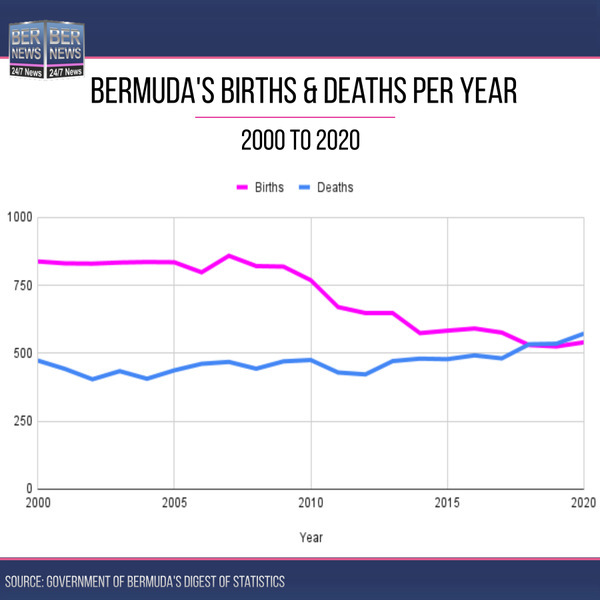Column: Birth Rate, Care, Education & More
[Opinion column written by Milena Pimentel]
Does Bermuda truly care and value families with young children? Recent data highlighting a decrease in birth rate in Bermuda accentuates the critical need to look at the early learning and child care sector on the island. This article combined with my own personal experiences of birthing and parenting on the island, appear to point to the notion that Bermuda may no longer be a feasible or sustainable place to raise a family.
Families, especially those with young children, lack the adequate resources that enable them to meet their basic needs. The accessibility of affordable and high quality early learning spaces is not prioritized for mothers returning back to work. This basic need is not being provided nor met, despite many mothers returning back to work shortly after a mere 13 weeks of giving birth.
What exactly are high quality early learning spaces? Some of the key components of high quality are: 1] Positive and nurturing relationships 2] Educator qualifications, support and compensation 3] Leadership and management, amongst others. The research in early childhood development repeatedly points to the fact that the first five years of a child’s life are crucial to their overall development. This time period is when our brains make the most neural connections it ever will and is influenced by our environment and early experiences; basically, I see it as a ‘do or die’.
From my own interest and research in understanding more about what Bermuda is doing with respect to early childhood education, I learned that in 2019, Dr. Terrylynn Tyrell, provided suggestions that would improve and advance this sector. One of the suggestions included replicating Happy Valley Childcare Centre in the West and East end of the island. My question, and what early childhood educators, teachers, social workers, policy makers, families and caregivers, should be asking is: where are we in this process?
Under priority number 2 outlined in the ‘Bermuda Plan 2022’, one of the long term adaptive strategies outlined is “early care programs that care for children between the ages of birth and four years old, are made affordable and are of high quality”…my question is to Hon. David Burt and Hon. Diallo Rabain, what does this mean specifically and how is your government going about doing this?
Never mind, that this is the only mention of some form of commitment to early childhood education [before the preschool years] in this document. If there is to be a reform in our early childhood sector, we need clear, detailed plans from our government to ensure that our students are “socially, emotionally, and academically ready for post-secondary success” [which is what Bermuda wants for students, right?]. The need for change is evident, Hon. Diallo Rabain states in this same document that they “are committed to using data to make decisions and to challenging the status quo” great– so where is the investment to collect this data, to prove to the rest of government that further investment and funding is needed to even consider any of these other plans? Questions like these are important and appear to have gone unasked!
We know the benefits far outweigh the cost, which for the Government is good news! We understand that governments care about the data and about adequate funding so let’s look at these. Research has proven that investment in the earlier years of life can have returns of up to $9.00 p/ $1.00 invested because there are benefits to the entire community, through lower crime rates, lower need of social assistance and less need for intervention services. We know that preventative measures are key and clearly, early childhood care is a very effective preventative measure!
Parents, caregivers, and childcare providers, we know the effort, commitment, and dedication put into the children we work with and care for. You have firsthand experience on the amount of devotion it takes to continue to show up every day to support the needs of the families you care for, and you know the emotional, physical and psychological toll it takes. You’re the ones waking up every damn day and doing it over and over again because you know these children and families need you. You deserve to be invested in, you deserve the training that will help you better support these children and families. You deserve to be adequately compensated for the work you do. Remember, you are not baby-sitters. You facilitate critical work and you deserve the recognition for it!
Next election, make sure you let the candidates know that this is what you want and what Bermuda needs! If we continue on this route, truthfully, my thought is that Bermuda will become a deserted, lifeless, “adult-only” island, which lacks the beauty, creativity, and vibrant energy that children bring. Government, you should especially be concerned, the decrease in birth rates will have implications to the future of Bermuda’s economy.
My final thought is, let’s stop talking about it, and actually be about it! Together as a collective, we need to understand early childhood development, the need for a greater investment in children and families, and advocate for our children while holding the government accountable in making this investment. This is what we truly need for our island and our children damn well deserve it!
P.S. If anyone is wondering why you aren’t eligible for reimbursements in the event of closures of your childcare centres due to COVID, yep that’s a lack of support for childcare providers from your government!
“There can be no keener revelation of a society’s soul than the way in which it treats its children”- Nelson Mandela
Shout out to Amy and Regina <3
- Milena Pimentel is a Child and Youth Study student at Mount Saint Vincent University and Research Assistant at the Early Childhood Collaborative Research Centre
20 Most Recent Opinion Columns
- 28 Jan: Column: Tyrrell On Covid, Rules, Balance & More
- 27 Jan: Column: Teen Dating Abuse Awareness
- 26 Jan: Column: Take Toxicity Away From Discourse
- 24 Jan: Column: Smith On Education, Covid Tests, More
- 24 Jan: Column: What Has Govt Done To Improve Life?
- 23 Jan: Column: Human Rights, Equality Act & More
- 20 Jan: Column: OBA Want ‘It Both Ways On Covid’
- 19 Jan: Column: ‘Remembering & Revering Our Seniors’
- 14 Jan: Column: 5 Money Mistakes Women Are Making
- 12 Jan: Column: Celebrating Dr Weldon’s Contributions
- 11 Jan: Column: Leadership, Accountability & More
- 07 Jan: Kim Swan Column: Fighting Life’s Inner Battles
- 20 Dec: Column: Susan Jackson On Drunk Driving
- 16 Dec: Column: PLP Platforms, Pledges Promises, More
- 12 Dec: Column: DUI, Roadside Checks, Notice & More
- 12 Dec: Carla Seely Column: Money Tips For Graduates
- 10 Dec: Column: Curtis Richardson On Electric Buses
- 02 Dec: Column: ‘Effects Of Flawed Airport Deal’
- 02 Dec: Column: Finances, Economy, Inflation & More
- 01 Dec: Column: Working Hard On Behalf Of Workers
Opinion columns reflect the views of the writer, and not those of Bernews Ltd. To submit an Opinion Column/Letter to the Editor, please email info@bernews.com. Bernews welcomes submissions, and while there are no length restrictions, all columns must be signed by the writer’s real name.
-




Wouldn’t it be good policy for employers to move from the US based model where parents have minimum parental leave to a more European model where family is valued and parents are provided leave in the child’s first year.
Many of society’s challenges appear to relate to the breakdown of family- one root cause is the need to earn trumping the need to parent.
“Bermuda may no longer be a feasible or sustainable place to raise a family.”
The same was said in the 1980s when family started growing. I did not agree then and I do not agree now. But then I have never been one for “living large”. If you want a big house and a big car before you have children you may want to move to a third world country, where the cost of living is less. If you live within your means and pay attention, there is no better (and safer) place to raise your children than Bermuda.